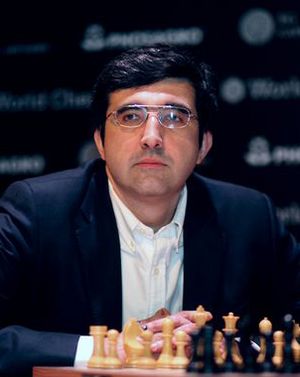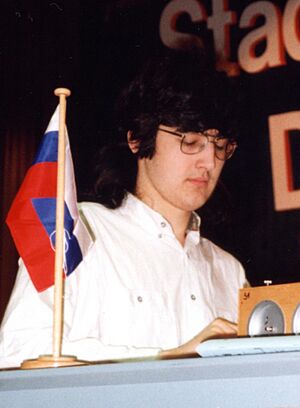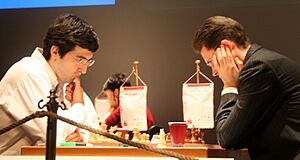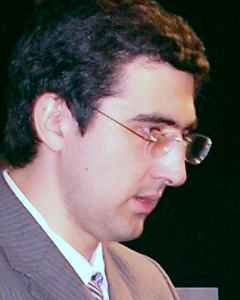Vladimir Kramnik facts for kids
Quick facts for kids Vladimir Kramnik |
|
|---|---|

Kramnik at the Candidates Tournament 2018
|
|
| Full name | Vladimir Borisovich Kramnik |
| Country |
|
| Born | 25 June 1975 Tuapse, Russian SFSR, Soviet Union |
| Title | Grandmaster (1992) |
| World Champion | 2000–06 (Classical) 2006–07 (undisputed) |
| FIDE rating | 2753 (February 2026) |
| Peak rating | 2817 (October 2016) |
| Peak ranking | No. 1 (January 1996) |
Vladimir Borisovich Kramnik (Russian: Влади́мир Бори́сович Кра́мник; born on June 25, 1975) is a famous Russian chess grandmaster. A grandmaster is the highest title a chess player can earn. He was the Classical World Chess Champion from 2000 to 2006. Then, he became the 14th undisputed World Chess Champion from 2006 to 2007.
In 2000, Kramnik played against Garry Kasparov, who was a very strong player. Kramnik won this match and became the Classical World Chess Champion. He successfully defended his title in 2004 against Peter Leko. In 2006, he also beat Veselin Topalov, who was the FIDE World Champion. This win made Kramnik the first undisputed World Champion since 1993. This meant he held both major chess titles at the same time.
In 2007, Kramnik lost his title to Viswanathan Anand in a tournament. He tried to win it back in 2008 but lost to Anand again. Kramnik remained a top player for many years. He played in four more Candidates tournaments between 2012 and 2018. He almost won in 2013. Kramnik announced he was retiring from professional chess in January 2019. He wanted to focus on projects that help children learn chess and on education.
Kramnik reached a very high rating of 2817 in October 2016. This makes him one of the highest-rated players ever. He is also known for his important ideas in opening theory, which is about the best ways to start a chess game.
Contents
- Early Chess Adventures
- Journey to World Champion
- Early Tries for the Title
- Winning the World Championship in 2000
- After Becoming Champion
- Defending His Title in 2004
- Unifying the World Title in 2006
- World Championship Tournament in 2007
- Challenging for the Title in 2008
- Strong Performances in 2009-2012
- Candidates Tournament and World Cup in 2013
- Later Career and Retirement
- Mentorship of Hans Niemann
- Matches Against Computers
- Personal Life
- Major Tournament Wins
- World Championship Matches and Qualifiers
- Kramnik's Chess Style and Impact
- Notable Games
- Videos by Kramnik
- See also
Early Chess Adventures
Vladimir Kramnik was born in Tuapse, a town by the Black Sea. His mother, Irina Fedorovna, is a music teacher. As a child, Vladimir studied at a special chess school started by Mikhail Botvinnik.
His first big success was winning a gold medal at the 1992 Chess Olympiad in Manila. He played for the Russian team. Some people were surprised he was chosen because he was only a FIDE Master at the time. But Garry Kasparov supported his selection. Kramnik played incredibly well, winning eight games and drawing one, without any losses. This performance earned him a gold medal.
The next year, Kramnik played in a strong tournament in Linares. He finished fifth and even beat Vasyl Ivanchuk, who was then the world number three. He continued to have good results. In 1995, he won his first major tournament, the Dortmund tournament, without losing a single game.
In 1995, Kramnik helped Kasparov prepare for his World Championship match against Viswanathan Anand. Kasparov won that match.
In January 1996, Kramnik became the world number-one rated player. He had the same rating as Kasparov but had played more games. This was the first time in over ten years that Kasparov was not number one. Kramnik was the youngest player ever to reach this top spot at that time. This record was later broken by Magnus Carlsen in 2010.
Kramnik kept achieving great results. He won the Dortmund tournament ten times between 1995 and 2011. He was also the second player ever to reach an Elo rating of 2800.
Journey to World Champion
Early Tries for the Title
In the 1990s, Kramnik was one of the best players. But he faced some challenges trying to qualify for a World Championship match. In 1994, he lost a match to Gata Kamsky. Later that year, he lost another match to Boris Gelfand. In 1998, Kramnik played against Alexei Shirov for the chance to challenge Garry Kasparov. Kramnik lost that match too. In 1999, he played in the FIDE knockout championship and lost in the quarterfinals.
Winning the World Championship in 2000
A match between Kasparov and Shirov did not happen. So, Kasparov decided to play against the highest-rated player. Viswanathan Anand was the highest-rated, but he declined. So, in March 2000, Kasparov announced he would play against Kramnik. This was a bit unusual because Kramnik had lost his qualifying match to Shirov.
In 2000, Kramnik played a 16-game match against Garry Kasparov in London. This was for the Classical Chess World Championship. Many people thought Kasparov would win. But Kramnik used a special opening called the Berlin Defence against Kasparov's Ruy Lopez. This worked very well. Kramnik won two games and didn't lose any. He won the match 8½–6½. This was a big surprise because it was the first time Kasparov had lost a World Championship match.
Kramnik's amazing performance earned him the Chess Oscar award for 2000.
After Becoming Champion
In October 2002, Kramnik played an eight-game match against a chess computer called Deep Fritz in Bahrain. Kramnik started well, leading 3–1. But in game five, he made a big mistake and lost. He also lost game six. The match ended in a 4–4 tie.
In February 2004, Kramnik won the Tournament of Linares for the first time. He didn't lose any games and finished ahead of Kasparov.
Defending His Title in 2004
From September to October 2004, Kramnik defended his Classical World Chess Champion title against Péter Lékó in Switzerland. It was a 14-game match. Lékó was ahead for most of the match. But Kramnik won the very last game, making the score 7–7. A draw meant Kramnik kept his title. The prize money was split between them.
Unifying the World Title in 2006
For many years, there were two "World Chess Champions" because Kasparov had separated from FIDE in 1993. When Kramnik beat Kasparov, he inherited the "classical" title. In 2006, FIDE announced a match to unify the titles. This match was between Kramnik and the FIDE World Champion, Veselin Topalov from Bulgaria.
The match took place in Elista, Kalmykia. Kramnik started with a 3–1 lead. After the fourth game, Topalov's manager complained that Kramnik was using the toilet too often. The committee decided that players had to use a shared toilet with an assistant. Kramnik refused to play game five under these new rules. So, Topalov was given the point, making the score 3–2. Kramnik said the committee was unfair and demanded changes.
Many chess fans and famous players supported Kramnik during this time. After twelve regular games, the score was tied 6–6. On October 13, 2006, Kramnik won the tie-break games, which were played faster. He won 2½–1½.
Kramnik's victory meant he unified the World Championship titles. He also won his second Chess Oscar award for 2006.
World Championship Tournament in 2007
When Kramnik won the 2006 unification match, he also earned a spot in the 2007 World Championship tournament. Even though he believed the title should change hands in a match, he said he would accept the winner of this tournament as the world champion.
The tournament was held in September 2007. Kramnik finished second. Viswanathan Anand won the tournament and became the new world champion.
Challenging for the Title in 2008
Following an earlier agreement, Kramnik and Anand played a match for the World Championship title in 2008 in Bonn. Kramnik lost three of the first six games. His play improved later, and he won one game, but he lost the match to Anand by a score of 6½ to 4½.
Strong Performances in 2009-2012
Kramnik had excellent results in 2009. He won in Dortmund again and then won the Tal Memorial tournament in Moscow. This was a very strong tournament with many top players. After this, Kramnik said his goal was to win back the World Championship title.
He also played in the London Chess Classic, finishing second. His strong performances helped him qualify for the Candidates Tournament for the 2012 World Championship.
In 2010, Kramnik played in the Corus chess tournament. He beat Magnus Carlsen, who was the new world number one at the time. This ended Carlsen's long unbeaten streak. Kramnik also helped Viswanathan Anand prepare for his 2010 World Championship match against Veselin Topalov. Anand won that match.
Kramnik won the President's Cup in Baku in 2010. He also played for the Russian team in the 2010 Olympiad. Later that year, he won the Grand Slam Chess Masters final in Bilbao. This was one of the strongest tournaments ever.
In 2011, Kramnik won the Dortmund tournament for the tenth time. He also won the London Chess Classic with a very high performance rating.
In 2012, Kramnik finished second in the London Chess Classic behind Carlsen.
Candidates Tournament and World Cup in 2013
Kramnik played in the 2013 Candidates Tournament in London. He tied for first place with Magnus Carlsen. However, Carlsen won because of better tie-break rules.
Later in 2013, Kramnik won the Chess World Cup 2013 in Norway. He defeated Dmitry Andreikin in the final match.
Later Career and Retirement
Kramnik's win at the Chess World Cup 2013 qualified him for the Candidates Tournament 2014. He finished third.
In 2015, Kramnik did not qualify for the Candidates Tournament 2016. He played in the World Rapid and Blitz Championships in Berlin. He finished third in the World Blitz Championship.
In 2016, Kramnik continued to play in top tournaments like the Dortmund Sparkassen Chess Meeting and the Tal Memorial. He also participated in the Grand Chess Tour events.
In 2017, Kramnik was still a top player. He finished second in the Gashimov Memorial and third in Norway Chess. He also gave a simultaneous exhibition in Geneva, winning almost all his games.
In 2018, Kramnik received a special invitation to the Candidates Tournament 2018. He started well, including a brilliant win against Levon Aronian. But he finished fifth in the tournament.
In January 2019, Kramnik played in the 81st Tata Steel Chess Tournament. After this, he announced his retirement from professional chess. He said he wanted to focus on chess for children and education. He might still play in faster chess events and give exhibitions.
Mentorship of Hans Niemann
In early 2024, Vladimir Kramnik met with American grandmaster Hans Niemann in Geneva, Switzerland. Niemann had expressed great respect for Kramnik and asked for his guidance. Niemann has since called Kramnik his "coach, mentor, and friend." Kramnik has also publicly confirmed their collaboration. Their close connection was seen when they arrived together at the 2025 Grenke FreeStyle Chess event.
Matches Against Computers
Deep Fritz Match in 2006
Kramnik played a six-game match against the computer program Deep Fritz in Bonn, Germany, from November 25 to December 5, 2006. He lost the match 2–4, with two losses and four draws. He received 500,000 Euros for playing. Deep Fritz used a powerful computer with two processors.
The first game was a draw. Some experts thought Kramnik missed a chance to win. Deep Fritz won the second game because Kramnik made a big mistake. The next three games were draws. In the last game, Kramnik tried to win by playing aggressively, but Deep Fritz outplayed him. Kramnik had to resign, and Fritz won the match 4–2.
This match was the last major human-computer chess match. Experts believed that computers had become too strong for humans to beat consistently.
Personal Life
On December 30, 2006, Kramnik married French journalist Marie-Laure Germon. Their wedding was in Paris. They have two children, a daughter named Daria and a son named Vadim Vladimirovich. They live in Geneva.
Kramnik has a health condition called ankylosing spondylitis, which is a type of arthritis. This can cause him discomfort when playing chess. In January 2006, he took a break from chess to get treatment for his arthritis. He returned in June 2006 and played in the 37th Chess Olympiad. He played very well, achieving one of the best performances there.
Major Tournament Wins
- 1990 Russian Championship, Kuibyshev
- 1991 World Championship (Under 18), Guarapuava
- 1992 Chalkidiki
- 1994 Overall result PCA Intel Grand Prix'94
- 1995 Dortmund
- 1995 Horgen
- 1995 Belgrade
- 1996 Monaco
- 1996 Dos Hermanas
- 1996 Dortmund
- 1997 Dos Hermanas
- 1997 Dortmund
- 1997 Tilburg
- 1998 Wijk aan Zee
- 1998 Dortmund
- 1998 Monaco (blindfold and rapidplay)
- 1999 Monaco (blindfold and rapidplay)
- 2000 Linares
- 2000 Dortmund
- 2001 Match Kramnik vs. Leko (rapidplay)
- 2001 Match Botvinnik memorial Kramnik vs. Kasparov
- 2001 Monaco (blindfold and rapidplay)
- 2001 Dortmund
- 2002 Match Advanced Chess Kramnik vs. Anand (León)
- 2003 Linares
- 2003 Cap d'Agde (France)
- 2004 Handicap Simul
- 2004 Kramnik vs. National Team of Germany
- 2004 Linares
- 2004 Monaco (overall result)
- 2006 Gold medal at Turin Olympiad with best performance
- 2006 Dortmund
- 2007 Monaco (blindfold and rapidplay)
- 2007 Dortmund
- 2007 Tal Memorial
- 2009 Dortmund
- 2009 Zürich (rapidplay)
- 2009 Tal Memorial
- 2010 President's Cup in Baku (rapidplay)
- 2010 Bilbao Grand Slam final
- 2011 Dortmund
- 2011 Hoogeveen
- 2011 London Chess Classic
- 2013 Chess World Cup 2013
He has won three team gold medals and three individual medals at Chess Olympiads.
World Championship Matches and Qualifiers
- PCA Quarterfinals, June 1994, New York, Kramnik lost to Gata Kamsky.
- FIDE Semifinals, August 1994 Sanghi Nagar, Kramnik lost to Boris Gelfand.
- Classical WCC Candidates Match, 1998, Cazorla, Kramnik lost to Alexei Shirov.
- FIDE WCC Knockout Quarterfinals, July 1999, Las Vegas, Kramnik lost to Michael Adams.
- Classical World Chess Championship 2000, London, Kramnik beat Garry Kasparov to win the Classical title.
- Classical World Chess Championship 2004, Brissago, Kramnik drew with Péter Lékó and kept his Classical title.
- FIDE World Chess Championship 2006, Elista, Kramnik beat Topalov to unify the title.
- FIDE World Chess Championship 2007 Runner up, Mexico City (lost the title to Anand).
- World Chess Championship 2008, Bonn, Kramnik lost to Anand.
- World Chess Championship 2012 Candidates Match Quarterfinals, April 2011, Kazan, Kramnik advanced.
- World Chess Championship 2012 Candidates Match Semifinals, April 2011, Kazan, Kramnik lost to Grischuk.
- World Chess Championship 2013 Runner-up, Candidates Tournament, March–April 2013, London.
- World Chess Championship 2014 Third place, Candidates Tournament, Khanty-Mansiysk.
- He did not qualify for the Candidates Tournament 2016.
- He played in the Candidates Tournament 2018 as a special invitee, placing fifth.
Kramnik's Chess Style and Impact
How He Plays
Garry Kasparov described Kramnik's playing style as practical and very determined. He was one of the hardest players to beat. Before his match with Kasparov, he lost only one game out of over a hundred. He even had an amazing streak of eighty games without a loss. Kasparov couldn't beat Kramnik in their 2000 World Championship match. This was partly because Kramnik used a strong defense called the Berlin Defence. Kramnik is also famous for his excellent skills in the endgame, which is the final part of a chess game.
His Influence on Chess
Kramnik has greatly influenced opening theory in chess. Viswanathan Anand once said that for many years, chess players were mostly using Kramnik's ideas for how to start games. Kramnik's strong play against the King's Indian Defence made Kasparov stop using it. This also made the opening less popular among top players for a long time. Kramnik's use of the Berlin Defence in his 2000 match against Kasparov made that opening very popular. Kramnik was also a leading expert in the Petrov's Defence and helped bring back the Catalan Opening.
Makruk (Thai Chess)
Kramnik also enjoys playing makruk, which is a type of Thai chess. In 2004, he quickly learned the rules and even beat a player named Dr. René Gralla. Kramnik thought Thai chess was more about strategy than international chess. He felt that players needed to plan their moves carefully, similar to how players think in the endgame of international chess. As the world chess champion, he once said he wanted to play a match combining makruk and chess against the makruk champion.
Notable Games
- Levon Aronian vs Kramnik, Candidates Tournament 2018, Berlin, Round 3, Ruy Lopez, Berlin Defence (C65), 0-1.
In this game, Kramnik used a new idea in the opening. He overwhelmed Aronian, choosing to attack instead of castling his king to safety. This led to a brilliant rook sacrifice and a quick checkmate threat against Aronian's king.
Videos by Kramnik
See also
 In Spanish: Vladímir Krámnik para niños
In Spanish: Vladímir Krámnik para niños
- List of chess games between Anand and Kramnik
- List of chess games between Kasparov and Kramnik
 | Selma Burke |
 | Pauline Powell Burns |
 | Frederick J. Brown |
 | Robert Blackburn |




